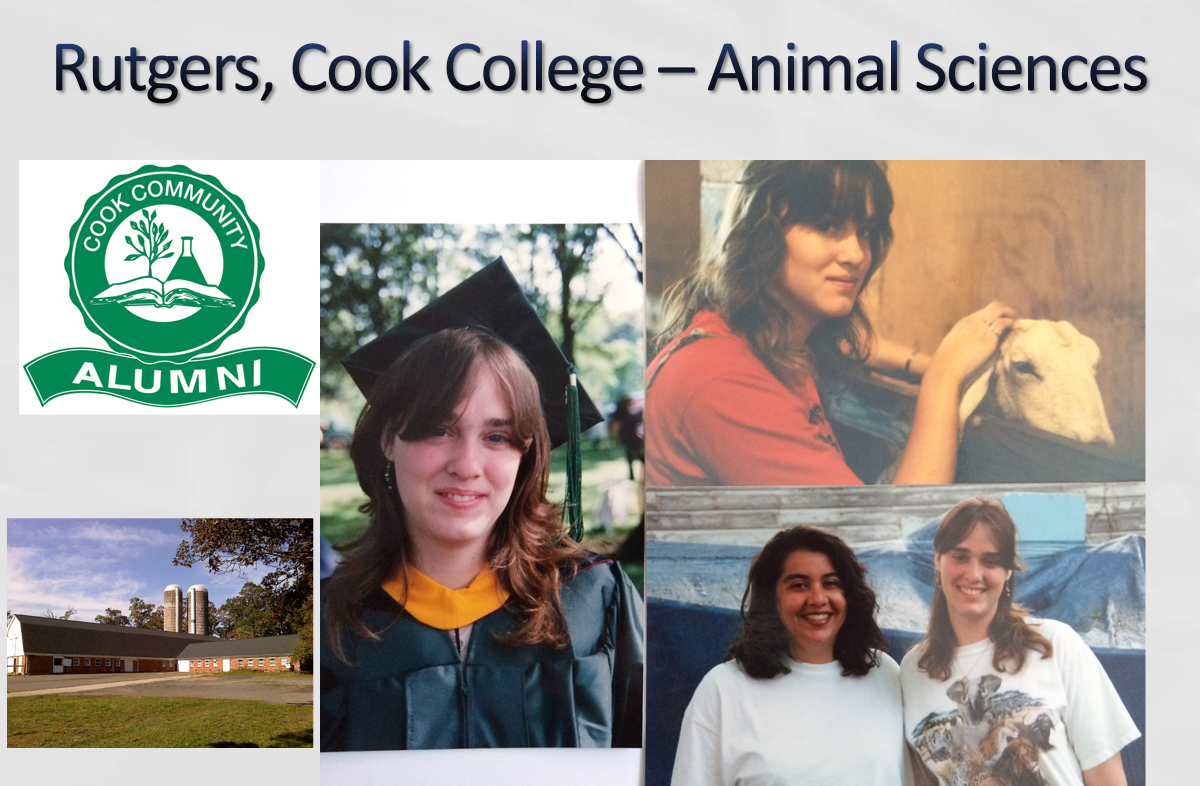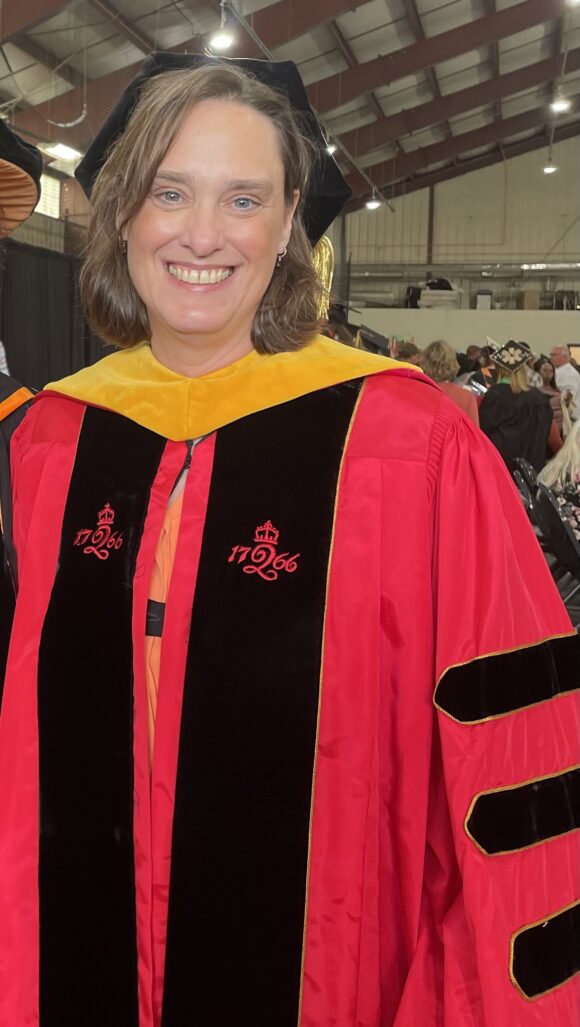
Dr. Darcy Medica shared a collage of favorite Cook College memories, including a photo of her Rutgers undergraduate roommate, Isabel Velez, who was also an animal science major. Courtesy of Dr. Darcy Medica.
Darcy Medica, Provost and Vice President for Academic Affairs at SUNY Cobleskill, is a triple Rutgers graduate, CC’93, GSNB’96, ’02. She’s the first in her family to attend college and went on to earn a bachelor’s, a master’s and a doctoral degree in Animal Sciences. Her father, Jim Velcheck (CC’97) graduated from Cook College while she was in graduate school.

Dr. Darcy Medica with her Rutgers Ph.D. regalia.
Darcy worked for a year at Temple University, teaching and coordinating their General Biology program. She also spent a year at NYU School of Medicine and in 2003, began teaching at Pennsylvania State University, Schuylkill Haven, rising to the rank of Associate Professor of Biology. In 2016, Darcy was appointed Director of Academic Affairs, implementing new initiatives that resulted in increased student retention and graduation rates, and presiding over the expansion of undergraduate research opportunities, the growth of the campus honors program, and the expansion and modernization of STEM and healthcare laboratories, classrooms, and student social spaces on campus.
In July 2023, Darcy was named the Chief Academic Officer, overseeing the more than 2,000 students and 100 full-time faculty at the agriculture and technology college in upstate New York. After a year and a half, Darcy is settling nicely into her role. She enjoys the challenges and rewards of a school that she finds very reminiscent of Cook College – including the appeal of the farm, where after a rough day, she gets “the chance to go visit baby goats, dairy cows and horses, and with the students working with them.”
Darcy reminisced about her time at Rutgers and the impact of Cook College on her life and career.
You’ve been serving in your new role at SUNY Cobleskill since July 2023. What’s the experience been like?
SUNY Cobleskill is a College of Agriculture and Technology in upstate New York. The focus on agriculture and hands-on learning, as well as the on-campus farm and other facilities are very similar to Cook College when I was there. I feel very much like I have come “full circle” back to my agriculture roots. This is a larger campus than Penn State Schuylkill, where I spent an amazing 20-year career as a faculty member and administrator but has many similarities in terms of the student body and initiatives on student success that are incredibly exciting and make this feel like the right place for me where I can make an impact. The faculty, staff and administration at SUNY Cobleskill are incredibly student focused, which I have made a goal myself during my career, as well.

Dr. Darcy Medica with a baby goat at SUNY Cobleskill. Courtesy of Dr. Darcy Medica.
What drew you to Rutgers and Cook College, in particular?
It was close to home and had a great animal science department. I was pre-vet when I started college. I was also able to afford to go there, between the lower cost than the out of state schools that I was accepted to, and the scholarships that I received. Cook campus was and is beautiful, with Passion Puddle and the farms and pastures, and this was a big attraction point for me.
Were there any experiences as an undergraduate that prepared you for a life in academia?
Undergraduate research. I started as a work study student cleaning glassware in a lab and moved into helping the technician and graduate students with their research. Ultimately, I started my own project and completed a George H. Cook honors project. This prepared me for the research process, thesis writing and presentation of research to an audience.
There’s often a particular professor that makes a significant impact during our college years. Who was that professor?
I was lucky enough to have two such professors. Dr. Barry Jesse presented at one of the recruitment events that I attended and was wonderful in answering questions that I asked after the presentation. It was in his lab that I started as a work study student and ultimately completed my honors project research. He was a fantastic mentor and supportive professor, and I learned so much from him and the others in his lab.
Dr. Michael Sukhdeo taught a course that I took during my junior year titled, “Animal Diseases,” and I learned so much in the class that was applicable to my potential career goals. My original plan was to go to veterinary school, and I worked for a vet at the time, and saw the application of much of what I learned in this class in the vet clinic. In addition, the exams were very scenario-based, with clinical symptoms, lab results, etc. I actually enjoyed taking those exams and figuring out the diseases and treatments.
Was there a particular class or research experience that proved to be particularly influential in your choice of career?
After the “Animal Diseases” course, Dr. Michael Sukhdeo asked if I would like to work in his lab for the summer. I did, assisting the post doc, Dr. Suzanne Sukhdeo, on a research project on tapeworms. I enjoyed the work very much and continued at Rutgers for my master’s and Ph.D. in Animal Sciences, working in this lab on animal parasitology.

Dr. Darcy Medica takes time to visit the animals at SUNY Cobleskill.
You’ve taught biology to a generation of undergraduates. Have you always wanted to teach, college-level or otherwise?
Not necessarily, my initial career aspirations were to be a veterinarian, and when I did not do well in “Intro Biology” and “Chemistry,” I decided to move towards the research track in the animal science major rather than working towards vet school. In my master’s program, I was a teaching assistant for “General Biology,” which I had struggled with and found ironic that I ended up teaching. I found that I loved working with students, and seeing the “ah ha” moment when they understood a concept was an awesome experience, and I decided that I wanted to be a college professor.
After more than a decade teaching at Penn State, what was the transition like to the administrative side of academia?
At Penn State, I oversaw many programs, student clubs, undergraduate research, honors, etc. and had worked closely with campus administration on these. I had some idea of how to move things forward, which was helpful as an administrator. I did miss the student interaction, as I generally only got to talk to them when they were unhappy about something. As a result, I stayed involved with student groups, helping to drive for trips and attending many student events to make sure that I still had that connection.
Looking back at your Rutgers journey, what stands out to you as the most challenging?
Some of my courses. Organic Chemistry was the toughest. I tell students now that I had to repeat it three times, but I was finally successful and now I have a Ph.D., so sometimes you just need to keep going when things don’t work out. In addition, I worked all through college, usually multiple jobs, and in the summer, I worked several jobs. This meant that I didn’t have a lot of time and needed to be smart about studying and making sure that I did everything I needed to.
Alternately, what did you find most rewarding?
The research projects I did, teaching experiences, faculty and graduate student colleagues, and the friends that I made, some of whom are still my closest friends and supporters. And I met my husband at Rutgers. He was a history major, and we met through friends. He has always been my biggest supporter through my career journey and recently located to upstate NY for my new position.
After completing your Ph.D. in 2002, have you been back at Rutgers?
I’ve been back for Ag field day and for visits with my Ph.D. lab several times. I also completed a sabbatical in the fall of 2012 where I continued some of my Ph.D. work with Dr. Sukhdeo and Dr. Peter Smouse. Things had changed quite a bit, but it was a great learning environment and wonderful to be back there.

